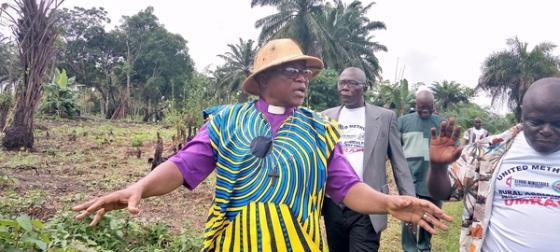Liberia: United Methodist Church Turns to Agriculture for Sustainability

Bishop Samuel J. Quire Jr., and other Clergymen tour the United Methodist Church (UMC) Multipurpose Farm in White Plains rural Montserrado County.
Liberia: United Methodist Church Turns to Agriculture for Sustainability
— “Agric-evangelism is the best way forward to sustain the church given the current economic crisis facing the many members of the church in Liberia,” Quire said.
The United Methodist Church (UMC) in Liberia is turning to agriculture to sustain its development and attract more people to the Gospel of Jesus Christ.
According to the Most Rev. Samuel Quire, the Resident Bishop of all the UMC Churches in the country, the position comes as the country's economic struggles make it difficult for many church members to support the church through tithes and offerings.
“Agric-evangelism is the best way forward to sustain the church, given the current economic crisis facing the many members of the church in Liberia,” Quire said.
The UMC, under his leadership, has moved with speed to dedicate a multipurpose farm in White Plains, Rural Montserrado County, worth approximately US$184,000.
The farm is expected to produce and process a variety of crops and livestock, including palm oil, corn, piggery, cassava, poultry, and large and small ruminants.
The United Methodist Rural Agriculture Development Program (UMRADP), which aims to make the church self-sustainable through agricultural initiatives, would manage the farm.
Quire noted that the Church has for more than five years been struggling to resuscitate the farm which got destroyed during the country's bloody civil war.
“I remembered in 2018 we were here to dedicate the cassava processing machines,” he noted. “It is important to note that agriculture is capital intensive, but once you get started, results are sure. We hope that in a couple of years to come we can be at a different level.
“We rejoiced that God has put it into the hearts of his people, specifically our Global Board of Ministries (GBM), through agriculture initiatives to scale up the facilities.
“To God be the glory, great and marvelous things he has done. I now accept these facilities on behalf of the Liberia Episcopal Area to dedicate and set them apart, for the production and processing of food commodities for the sustenance of humankind,” he added.
Meanwhile, Rev. Joseph Theoway, the Church Director for Agriculture, explained that due to the financial challenges in the country, the UMC’s agriculture program had for years been greatly impacted and almost became inactive.
However, under Quire’s vision for agricultural development, the program, Theoway said, has been rejuvenated, and its goals and objectives have been realigned with a focus on food security and poverty reduction nationwide.
“The Department of Agriculture came under serious scrutiny and its goals and objectives were analytically revised and aligned with Bishop Quire’s vision for Agriculture development — food security and poverty reduction nationwide within the Liberia Episcopal Area.
“The Methodist bishop, as contained in his first Episcopal address, called for the department of Agriculture to engage in cash and food crop production in an endeavor to empower the conference to provide support to its pastors, congregations, ministries, and other programs,” Theoway said.
Meanwhile, Bishop Quire has disclosed that Alexander Cummings, the political leader of the Alternative National Congress (ANC) contributed US$10,000 for the farm project, which was appropriated for land clearing.
The Methodist Prelate also used the occasion to encourage local churches to take advantage of the agriculture initiatives, taking “into consideration how well land in the area is fertile.”
